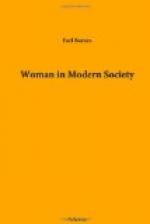As a mother, the woman is supposed to give children a good heritage, nurse them, care for them, doctor them and train them. We have established values for these services as wet-nurse, nurse-maid, governess, doctor and teacher, but who can estimate a woman’s value in giving a child a good heritage?
It is no wonder that such a difficult problem has remained thus far unsolved. Here and there a man gives his wife a household allowance, from the money they earn in common, and she struggles to save from it some fragments for her individual needs; others put their wives on a salary; and some others divide the income on a fractional basis. But the slightest study of existing conditions must convince any one that women are everywhere deeply dissatisfied with their economic relations to the family. On referring recently to this fact before an audience almost equally divided between suffragists and anti-suffragists, I found every woman present applauding the statement. Another time when I asked more than sixty of the wealthiest women in one of our cities how many were dissatisfied with their relations to the family property, explaining that I was not asking how many wanted more money but how many wanted a different relation to the family money, all the women raised their hands except three and they all had private property.
Meantime, economic changes, to be described in the next chapter, have transformed our homes and nearly eight million women have gone outside to earn money. The gladness with which they have gone shows that they were not afraid to work, though at first the money did not belong to them, but to their families. Almost everywhere in the United States the money women now earn is their own; only in Louisiana can the husband collect his wife’s wages. Any one who reads Mrs. Gilman’s masterly study of the evil effects accompanying woman’s economic independence must feel how far-reaching are not only the discontent but also the evil influences of our present system through over-emphasizing sex and through corrupting the public thinking and feeling concerning services and wages in general.[32]
[32] CHARLOTTE PERKINS GILMAN, Woman and Economics, Boston: Small, Maynard & Co., 1898. See, also, Woman and Labor, by OLIVE SCHREINER, New York: Frederick A. Stokes Co., 1911.
Yet no one can seriously approach this problem in his own person without feeling that the relations of husband and wife contain elements that not only make it impossible to resolve the woman’s service into money values, but that would make it useless to do so even if it could be done. The most distinctive quality of love is its desire to give. Love that seeks to get is not love. If when a woman gives herself she tries to secure individual property it will be only that she may give it to the man she loves. Marriage is a partnership of soul and body, and this includes property. It still remains true, however, that each must have in order that he may give. Besides this, there are always outside obligations, and special needs within the group, that require individual property for their realization.




